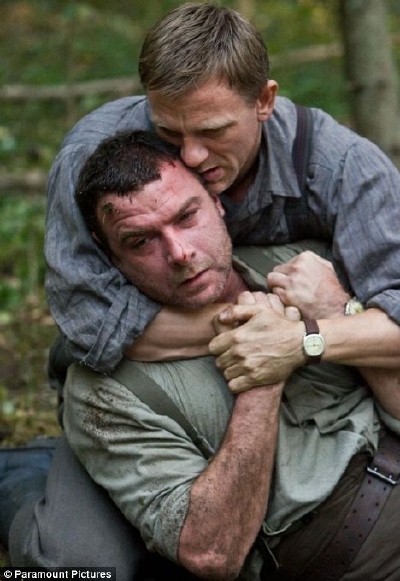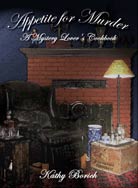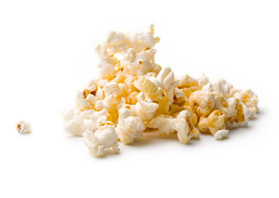Defiance: Potato Babka Recipe
Year Released: 2008
Directed by: Edward Zwick
Starring: Daniel Craig, Liev Schreiber, Jamie Bell, Alexa Davalos, Tomas Arana
(R, 137 min.)

"One man with courage makes a majority." Andrew Jackson
They are defenseless. Many are old or ailing, but the cadre of Jews who join the Beilski brothers in their forest hideout vow to survive and resist the Nazi invasion of their homeland. They may die, but they will die on their feet with guns in hand, not cowering in their ghettos.
Based on the true story of the four Bielski brothers, whose small band of survivors swelled to 1200 by the end of the war, this tale does not deal with grandiose battles or daring act of resistance. Instead it recalls the inner struggle to retain some shred of decency and dignity in the savage world surrounding them. Often they fail to live up to their idealism, or conversely, when they do, it lashes back at them with a vengeance.
The film does not sanitize the brothers, particularly Tuvia (Daniel Craig) and Zus (Luv Schreiber), who struggle with the passion for revenge as much as the desire to stay above it. “We may be treated like animals,” Tuvia tells the refugees just joining them in the forest, “but we will not become animals.” And for the most part, they do not.
Tuvia confronts a collaborating local policeman who has killed his parents in cold blood, lamenting only that he had not gotten any of their four sons. Tuvia listens briefly to the usual rationale as the man pleads for his life, but he is not moved. However, it will be the words of the wife, who now looks at the lifeless bodies of her husband and two grown sons, that will haunt him. “Kill me too, “ she pleads in her anguish. But Tuvia and Zus will eat their bitter gruel as well, as each learns about the death of his own wife, Zus losing a young son as well.
Similarly, a food mission quickly turns to a killing spree, Tuvia, Zus, and others taking their bloody retaliation on collaborators, but losing many of their own when a military caravan confronts them. The orders now are for more compromise. They take only half of a farmer’s milk and let him go, but he quickly retaliates and brings the Germans down upon them in the woods. “So much for diplomacy,” spits out a bitter Zus, whose first instincts had been to kill the farmer and take all the milk.
Other acts of charity are similarly rewarded. A farmer friend, who is not Jewish, gives Tuvia a gun and four bullets, while his wife glares her disapproval. Later, when Tuvia comes back for some food, she tells him to go to the barn. There, dangling from a noose is his friend with the words “Jew Lover” scrawled next to his corpse.
Even fellow Jews do not understand the barbarism that has seized their world. They remain in their ghettos even as more and more are led to their deaths, meekly reasoning that the Nazis certainly will not kill them all. They are needed, after all, to work in the factories.
As the cold and lack of food close in on them, some of this barbarism crops up the forest camp as well. Again, Tuvia’s first response is one of reason, but as we humans are often very late to learn, reason does little against sheer ruthlessness. In the end, Tuvia will have to summon up his own ruthless will to end the evil within.
Ah, but the cold cannot be dispensed as easily. It penetrates to the bone, and we absorb it through the pinched faces and hunched shoulders that stand in the cold for a watery serving of soup. Disease too is an unwelcome guest, Tuvia hacks violently as he waits helplessly in a car while Zus and others raid a police station for its supply of antibiotics.
Even surrounded by their enemies, the survivors often fight themselves, Tuvia and Zus grappling on the ground in a vicious quarrel right in the midst of the whole camp. Zus scorns the “pretentious Jews” looking to them now for protection, Jews who in their ordinary lives would shun the ill educated farmers that he and Tuvia are.
But somehow, despite the cold, the disease, and the constant struggle to find food, the core of the group survives until the barbarism around them is quelled.
Quelled, but alas, not conquered, I fear.
“And what rough beast, its hour come round at last,
Slouches towards Bethlehem to be born?”
—Kathy Borich
Film-Loving Foodie
The meals at the forest camp revolve around beets and potatoes, with eggs and milk thrown in if they are lucky. As they peel the endless potatoes, one of the women remarks, “What will it be tonight, potatoes with beets.? And tomorrow, beets with potatoes?
If you are interested in beets, you might try this Classic Russian Borscht.
For today, I’ve chosen a “Potato Babka,” literally a potato pie, which is really a rich casserole featuring potatoes, eggs, onion, bacon, and milk. This is a popular dish in our film's setting of Belarus or Belorussia, as if was called during World War II, a territory with both Russian and Polish influences.
It sounds purely delightful for a cold winter’s night.
Other possibilities are:
Absolutely Ultimate Potato Soup
Potato Babka
(Potato and Egg Casserole)
- 5 large red skin potatoes
- 3 eggs
- 2 large onions (diced)
- 4 slices of bacon
- 2 large tablespoons of Crisco (solid, not liquid)
(You can substitute butter, margarine or another healthy spread.) - 1 cup milk
- Salt & pepper to taste
Cut the bacon into small slivers. In a large skillet, add the bacon and the diced onions and sauté until the onions are translucent. Add two large heaping tablespoons of Crisco. While the onions are sautéing, in a large mixing bowl add the milk and the eggs and blend together. Then grate the potatoes in that mixture. When all the potatoes are grated, add the contents of the skillet (fat, cholesterol and all) to the contents of the bowl, stirring all the time.
When all ingredients are mixed, pour into a casserole dish or pan about 2 1/2 to 3 inches high. Bake in a 375-degree oven for half an hour and then reduce the heat to 350 and bake for an additional hour or until solid in the middle.
Recipe Source: Recipelink.com



 Rainy Day Rentals
Rainy Day Rentals